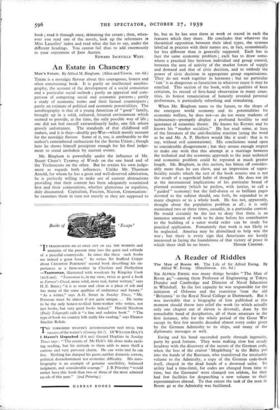An Estate in Chancery
Man's Estate. By Alfred M. Bingham. (Allen and Unwin. 125. 6d.)
THERE is a nostalgic flavour about this courageous, honest and often entertaining book. It is partly an intellectual autobio- graphy, the account of the development of a social conscience and a particular social outlook ; partly an appraisal and com- parison of competing social and economic patterns ; partly a study of economic terms and their factual counterparts ; partly an estimate of political and economic potentialities. The autobiography is that of a young American of " good " family, brought up in a solid, cultured, leisured environment which seemed to provide, at the time, the only possible way of life ; one did not feel oneself extraordinarily lucky, one felt others grossly unfortunate. The standards of that childhood still endure, and it is they—doubly pre-War—which mostly account for the nostalgic flavour. Some of it, too, is attributable to the author's remembered enthusiasm for the Soviet Union ; though here he shows himself percipient enough for his final judge- ment to stand unshaken by current events.
Mr. Bingham is powerfully under the influence of Mr. Stuart Chase's Tyranny of Words on the one hand and of the Technocrats on the other. But he retains his own judge- ment as regards both influences. Unlike Mr. Thurman Arnold, for whom he has a great and well-deserved admiration, he is perfectly willing to make use of current abstractions providing that their content has been adequately scrutinised first and their connotations, whether glamorous or repulsive, duly discounted. Capitalism, Fascism, Nazism, Communism : he examines them in turn not merely as they are supposed to be, but as he has seen them at work or traced in each the features which they share. He concludes that whatever the theoretical opposition between their ideal types, the systems labeled in practice with their names are, in fact, economically far less different than is generally supposed. Each has to face the same economic problem ; each has to draw some- where a practical line between individual and group control, between the area of activity of the market forces of supply and demand and that of civic decision, and to embody the power of civic decision in appropriate group organisations. They do not work together in harmony ; but no particular ' ism ' is as dangerous as fanaticism in whatever cause it may be enrolled. This section of the book, with its qualities of keen criticism, its record of first-hand observation in many coun- tries, its honest renunciation of honestly revealed personal preferences, is particularly refreshing and stimulating.
When Mr. Bingham turns to the future, to the shape of the emergent world economy and its potentialities for economic welfare, he does not—as do too many students of technocracy—promptly display a profound hostility to and ignorance of economic theory. He knows his Keynes and he knows his " market socialists." He has read some, at least of the literature of the anti-Socialist reaction (using the word as he and Mr. A. P. Herbert would like it used : that is to say, without evil connotations). His conclusions stand open to considerable disagreement ; but they arouse enough respect to make one wish that this attempt at a marriage between the technical and the economic approach to the joint technical and economic problem could be repeated at much greater length. Mr. Bingham, in this section, has bitten off consider- ably more than he can chew, and an impression of super- ficiality results which the rest of the book assures one is not the result of a superficial habit of thought. He does not jib at the international implications of his particular brand of planned economy (which he prefers, with justice, to call a " guided " economy) but the half-dozen or so brilliant pages devoted to the subject should, one feels, be expanded to as many chapters or to a whole book. He has not, apparently, thought about the population problem at all ; it is only mentioned two or three times, casually, in a particular context. He would certainly be the last to deny that there is an immense amount of work to be done before his contribution to the building of a saner world order can be ready for practical application. Fortunately that work is not likely to be neglected. America may be disinclined to help win the war ; but there is every sign that Americans are keenly interested in laying the foundations of that victory of peace in which there shall be no losers. HONOR CROOME.








































 Previous page
Previous page